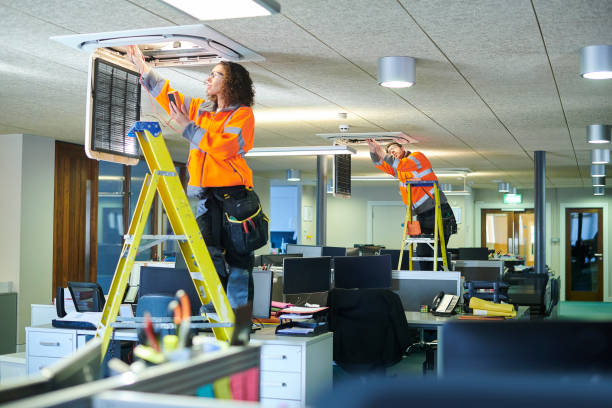HVAC, often overshadowed by more visible aspects of home and commercial building design, holds its ground with an indispensable blend of functionality and innovation. This unsung hero of indoor comfort brings a seamless integration of heating, ventilation, and air conditioning to spaces, making it vital for not just comfort, but also for health and efficiency. This unique system stands out in the vast world of building utilities, offering an experience that elevates HVAC beyond a mere background operation to a critical component of modern living.
Key elements of HVAC systems include furnaces, air conditioners, ventilation systems, and thermostats, each known for their specific roles in maintaining indoor climate control. Single and multi-zone HVAC systems also shine, providing tailored solutions that cater to the diverse needs of spaces ranging from cozy homes to sprawling commercial complexes. Diving deeper, each component of the HVAC system showcases its own set of functionalities, engineering marvels, environmental impacts, and guidelines for optimal use.
The following sections will delve into these aspects in detail, furnishing a comprehensive understanding of what makes HVAC an essential fixture in buildings around the globe.
HVAC stands for Heating, Ventilation, and Air Conditioning
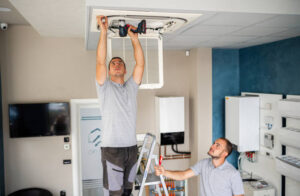
HVAC is the backbone of indoor comfort, combining heating, ventilation, and air conditioning to maintain a pleasant indoor atmosphere. This trio works together to ensure that regardless of the weather outside, the indoor environment remains exactly how you want it. Heating components like furnaces keep spaces warm during cold spells, while air conditioners provide a cool refuge from the summer heat.
Ventilation systems are the unsung heroes, continually refreshing the indoor air to keep it clean and fresh. Thermostats, the brains of the operation, allow for precise control over these systems, ensuring that comfort is just a button press away. This integrated approach not only makes living and working spaces more enjoyable but also healthier and more energy-efficient.
It regulates temperature, humidity, and air quality
An HVAC system plays a pivotal role in creating comfortable indoor environments by regulating temperature, humidity, and air quality. By adjusting the temperature, it ensures spaces remain warm in the winter and cool in the summer. Through controlling humidity, it keeps the air from becoming too dry or too moist, thus avoiding discomfort and potential health issues.
Moreover, filtering and circulating the air, significantly improves indoor air quality, removing pollutants and allergens. This regulation is essential not just for comfort but also for safeguarding the health of occupants, making HVAC systems indispensable in homes, offices, and industrial settings.
Essential for creating comfortable indoor environments
HVAC systems are fundamental in shaping comfortable indoor environments. They achieve this by precisely managing the temperature to suit seasonal needs, balancing humidity levels to prevent dryness or dampness, and enhancing air quality by filtering out pollutants. This creates spaces where people can live, work, and relax in comfort, regardless of the conditions outside.
The ability of HVAC systems to maintain these optimal conditions makes them a crucial component in any building, ensuring environments are not only comfortable but also healthy and conducive to productivity.
HVAC systems are crucial in various settings
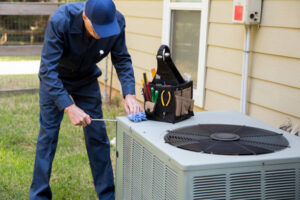
HVAC systems play a vital role across a wide range of settings, from residential homes to commercial offices and large industrial buildings. They ensure that regardless of the external weather conditions, the indoor environment remains comfortable and safe for occupants. In homes, they provide a sanctuary from extreme temperatures, while in commercial and industrial settings, they support productivity and protect equipment from damage caused by improper climate control.
The versatility and adaptability of HVAC systems make them indispensable for creating optimal living, working, and operational conditions in virtually any indoor space.
Homes, offices, and industrial buildings
HVAC systems are essential in homes, where they create comfortable and healthy living spaces by controlling temperature and air quality. In offices, they contribute to a productive work environment by maintaining optimal climate conditions. Industrial buildings rely on HVAC for protecting equipment and ensuring safe working conditions by regulating temperature and humidity.
Each setting has unique requirements, and HVAC systems are designed to meet these diverse needs, making them indispensable across various environments.
Components of HVAC systems vary
The components of HVAC systems are diverse, each serving a specific function to maintain indoor comfort. Furnaces generate warmth, distributing heated air through spaces during colder months. Air conditioners offer relief from heat, cooling down rooms when temperatures rise.
Ventilation systems ensure a continuous exchange of indoor and outdoor air, keeping the environment fresh and free from pollutants. Thermostats give users control over these systems, allowing for precise temperature and humidity adjustments. This variety in components allows HVAC systems to be tailored to the specific needs of different settings, ensuring optimal performance and efficiency.
Furnaces heat air for distribution
Furnaces play a crucial role in HVAC systems by heating air and distributing it throughout a space, ensuring warmth during colder months.
Air conditioners cool air during warm periods
Air conditioners provide a necessary respite from the heat, cooling down indoor environments to maintain comfort during warmer periods.
Ventilation systems exchange indoor and outdoor air
Ventilation systems are key to maintaining a healthy indoor environment, constantly exchanging indoor air with fresh outdoor air to remove pollutants and control humidity.
Thermostats control the system’s operation
Thermostats offer users the ability to precisely control the operation of HVAC systems, adjusting settings for optimal temperature and comfort levels.
Maintenance enhances performance and efficiency
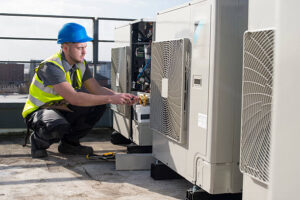
Regular maintenance is key to ensuring HVAC systems operate at their peak performance and efficiency. Simple tasks like changing filters can prevent airflow blockages, while seasonal inspections can identify and fix potential issues before they lead to breakdowns. This proactive approach not only prolongs the life of the system but also keeps energy consumption in check, leading to lower utility bills and a reduced environmental impact.
By investing in maintenance, homeowners and businesses can enjoy consistent comfort, better air quality, and significant cost savings over time.
Regular filter changes are necessary
Changing filters regularly is essential for maintaining airflow and ensuring the HVAC system runs efficiently, helping to improve air quality and reduce wear on the system.
Seasonal inspections prevent breakdowns
Seasonal inspections are crucial for identifying and addressing potential issues early, preventing unexpected breakdowns and ensuring the system operates smoothly throughout the year.
Energy efficiency reduces operational costs
Opting for energy-efficient HVAC systems significantly lowers operational costs. High-efficiency units use less energy to heat or cool spaces, which translates to lower energy bills for homeowners and businesses. Additionally, smart thermostats can further optimize energy use by adjusting heating and cooling schedules to match occupancy patterns, ensuring no energy is wasted.
This focus on energy efficiency not only saves money but also contributes to a greener, more sustainable environment by reducing the overall carbon footprint of heating and cooling operations.
High-efficiency units lower energy consumption
High-efficiency HVAC units are designed to use less energy for heating and cooling, leading to significant reductions in energy consumption and utility costs.
Smart thermostats optimize heating and cooling schedules
Smart thermostats enhance HVAC efficiency by automatically adjusting heating and cooling schedules based on real-time needs, ensuring optimal comfort while minimizing energy use.
Professional installation ensures proper setup
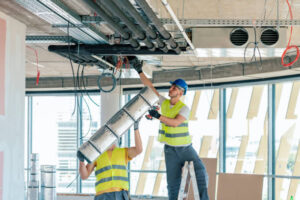
Ensuring an HVAC system is installed correctly is crucial for its efficiency and longevity. Professional installation guarantees that the system is set up according to the manufacturer’s specifications, which helps prevent issues related to improper setup, such as inefficiencies or frequent breakdowns. Experts in HVAC installation have the knowledge and tools to ensure that every component, from ductwork to thermostats, is correctly connected and functioning.
This not only optimizes the system’s performance but also safeguards against unnecessary energy consumption and costs, making professional installation a wise investment for both new and upgrading HVAC systems.
Incorrect installation can lead to inefficiencies
Incorrect installation of an HVAC system can result in significant inefficiencies, leading to higher energy consumption and increased costs. Proper setup by professionals is essential to avoid these pitfalls and ensure the system operates at its best.
Costs depend on system choice and complexity
The cost of an HVAC system varies widely depending on the type of system selected and its complexity. Opting for a high-efficiency model or a system with advanced features, such as smart thermostats and zoning capabilities, can lead to higher upfront costs. However, these systems often result in lower operational costs over time due to their energy-saving benefits.
Conversely, simpler, less efficient systems may have lower initial costs but can lead to higher energy bills and more frequent replacements. The complexity of installation, including the need for new ductwork or modifications to existing structures, also significantly impacts the overall cost. Careful consideration of these factors is essential when choosing an HVAC system to ensure it meets both comfort needs and budget constraints.
Higher upfront costs for energy-efficient models
Energy-efficient HVAC models typically come with higher upfront costs. These advanced systems, equipped with the latest technology, require a larger initial investment.
Long-term savings on utility bills
Despite the higher initial cost, energy-efficient HVAC systems lead to significant long-term savings on utility bills. Their optimized performance and lower energy consumption offset the initial investment over time.
Innovations continue to evolve in HVAC technology
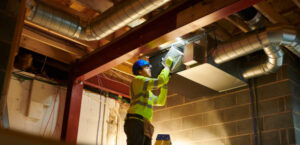
The field of HVAC technology is constantly advancing, with new innovations aimed at increasing efficiency and reducing environmental impact. Developments such as smart thermostats, which learn user preferences and adjust heating and cooling automatically, and energy-efficient models that use less power and reduce utility bills, are at the forefront of these changes. Additionally, the integration of renewable energy sources and the use of environmentally friendly refrigerants are making HVAC systems more sustainable.
These technological advancements not only enhance the performance and user experience of HVAC systems but also contribute to a greener planet by minimizing carbon emissions and energy consumption.
Developments aimed at increasing efficiency and reducing environmental impact
Recent developments in HVAC technology focus on enhancing system efficiency and minimizing environmental impact. Innovations such as more effective insulation materials, advanced heat pump technology, and smart systems that optimize energy use are leading the way. These advancements not only improve the performance of HVAC systems but also contribute to a more sustainable future by reducing energy consumption and lowering greenhouse gas emissions.
In Summary
HVAC systems are essential for creating comfortable, healthy, and energy-efficient indoor environments across various settings. By regulating temperature, humidity, and air quality, they ensure optimal living and working conditions. Regular maintenance and professional installation further enhance their performance and longevity, making them a wise investment.
Take the next step towards ultimate indoor comfort by exploring advanced HVAC solutions today. Contact us now for a FREE Estimate!

